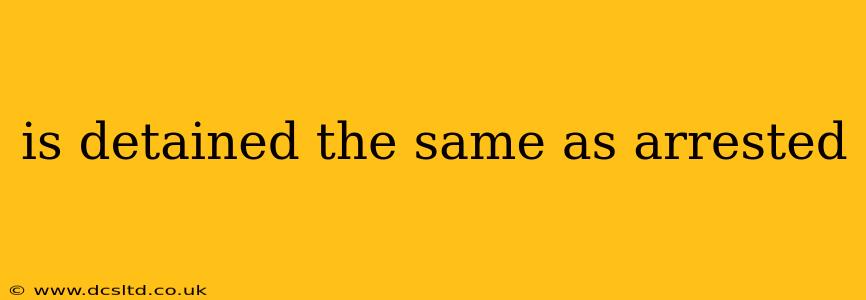The terms "detained" and "arrested" are often used interchangeably, leading to confusion. While both involve a restriction of freedom, there are crucial legal distinctions. This article will clarify the differences between detention and arrest, exploring the legal implications and procedures involved in each.
What is Detention?
Detention is the temporary holding of a person by law enforcement. It's a less formal process than arrest and typically involves a shorter period of confinement. Detention can occur in various circumstances, such as:
- For questioning: Police might detain someone for questioning if they are a witness or a person of interest in a crime. This detention is usually brief and doesn't imply guilt.
- For investigation: During an investigation, police may detain an individual to gather more information or evidence. Again, this doesn't equate to an arrest.
- At a border crossing: Immigration officials may detain individuals for questioning related to their immigration status.
- In a mental health context: Individuals experiencing a mental health crisis might be detained for evaluation and treatment.
Crucially, during detention, a person is generally not considered to be "under arrest" and doesn't have all the same legal rights as someone who has been formally arrested.
What is Arrest?
Arrest is a more formal and serious legal action. It signifies that a person is being taken into custody on suspicion of committing a crime. An arrest usually involves:
- Formal charges: An arrest is typically followed by formal charges being filed.
- Miranda rights: In many jurisdictions, individuals being arrested are informed of their Miranda rights (the right to remain silent, the right to an attorney, etc.).
- Booking process: After arrest, a person is typically booked at a police station, which involves fingerprinting, photographing, and recording personal information.
- Jail or bail: Following the booking process, an arrested individual may be held in jail until bail is posted or a court appearance occurs.
The key distinction is that an arrest signals a belief by law enforcement that sufficient probable cause exists to believe a crime has been committed and that the individual arrested is responsible.
What are the Legal Rights During Detention vs. Arrest?
The legal rights afforded to an individual differ significantly depending on whether they are detained or arrested. During detention, rights might be limited compared to the more extensive rights afforded during an arrest. For example, the right to an attorney may not immediately apply during detention. However, the exact limitations depend on the specific circumstances and jurisdiction. It’s essential to understand that both situations demand respect for your basic human rights.
H2: How Long Can Someone Be Detained?
The length of detention is highly variable and depends heavily on the circumstances. While detention is typically short-term, there are legal limits on how long someone can be held before being formally arrested or released. These limits vary by jurisdiction and the specific reasons for detention. Exceeding these time limits without proper legal justification can render the detention unlawful.
H2: Can Detention Lead to Arrest?
Yes, detention can absolutely lead to an arrest. If, during the detention process, law enforcement gathers sufficient evidence to establish probable cause, they can then proceed with a formal arrest.
H2: What if I believe my detention was illegal?
If you believe your detention was illegal, you should seek legal counsel immediately. A lawyer can advise you on your rights and help determine the appropriate course of action.
In summary, while both detention and arrest involve restricting a person's freedom, arrest is a more formal, serious legal procedure that carries far more significant legal implications. Understanding the differences is crucial to protecting your rights. This information is for educational purposes only and should not be considered legal advice. Always consult with a legal professional for guidance on specific legal matters.
